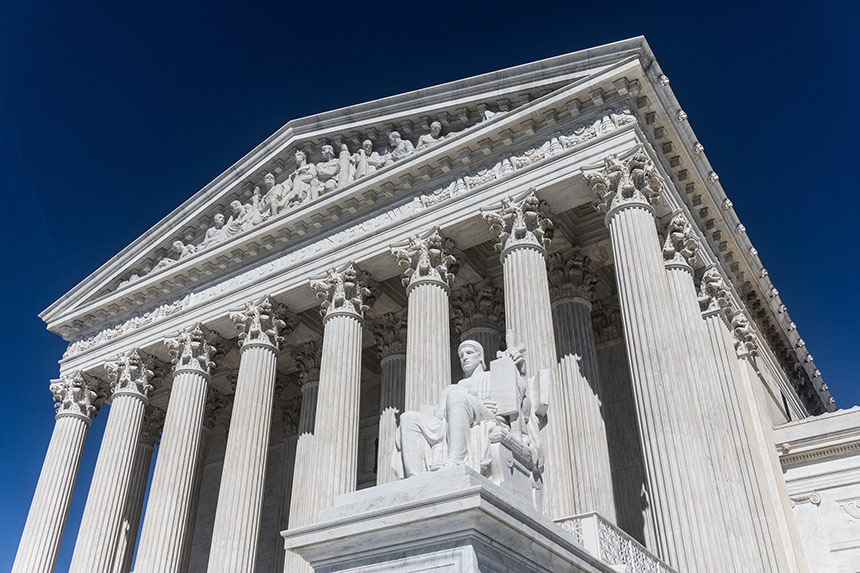
By Gwyneth K. Shaw
Last year, Texas lawmakers passed a bill aimed at restricting access to porn websites for people under 18. A legal firestorm ensued — and the U.S. Supreme Court will attempt to resolve it, beginning with oral arguments scheduled for next month.
Opponents of the law, which resembles restrictions in other states including Arkansas, Louisiana, Mississippi, Montana, North Carolina, Utah, and Virginia, argue that its reach would extend far beyond the Internet, affecting bookstores, libraries, publishers, and mainstream websites. In addition, the verification requirements would impinge on the First Amendment rights of adults to access these materials, they say.

UC Berkeley Law Professor Kenneth A. Bamberger recently wrote an amicus brief on behalf of the American Booksellers for Free Expression, the Association of American Publishers, the Authors Guild, the Comic Book Legal Defense Fund, the Freedom To Read Foundation, and the Independent Book Publishers Association. The brief asserts that the U.S. 5th Circuit Court of Appeals erred when it upheld the legislation in Free Speech Coalition, Inc. v. Paxton, the case that will come before the Supreme Court Jan. 15, by reducing the scrutiny level applied to a content-based regulation on speech because it purports to protect minors. Unbroken precedent had previously applied strict scrutiny to such laws.
Bamberger, an expert on technology, government regulation, and corporate compliance in both the U.S. and Europe, teaches the speech and religion aspects of First Amendment law, as well as courses on administrative law, torts, and privacy. He’s a faculty co-director of the Berkeley Center for Law & Technology, the law school’s tech law hub.
Below, he outlines the issues at stake and why they matter as laws restricting access to books and other information proliferate around the nation.
What’s happening here?
The Supreme Court is reviewing a Fifth Circuit opinion that turns First Amendment precedent on its head. While content-based regulation of expression has long been reviewed under strict scrutiny, the lower court decision applied a much less demanding standard to a Texas law that has the effect of broadly regulating content on the Internet, on the grounds that the stated purpose of the restriction is to target speech that is harmful to minors. Specifically, the appeals court asked only whether the law at issue has a “rational basis.”
If the Fifth Circuit decision were to stand, it could permit laws that broadly restrict adults’ and older minors’ access to materials that they have a constitutional right to read — both online and in physical bookstores and libraries. This would include contemporary fiction, literary classics, and young adult fiction, as well as works dealing with health, sexuality, and other matters that might be deemed inappropriate for the youngest minors.
Efforts to restrict books and other materials in the name of protecting minors — materials that are constitutionally protected for older minors and adults — abound. The American Library Association reports that the number of titles targeted for censorship increased by 65% from 2022 to 2023. In Texas itself, Gov. Greg Abbott asked the Texas Education Agency to investigate the presence of “pornography” books in public schools to protect children, and a state legislator sent a list of about 850 books about race and sexuality to school superintendents, asking if they carried them.
Indeed, book challenges in the name of protecting minors became so prevalent in Florida that Gov. Ron DeSantis this year scaled back policies that made it easier to challenge books in schools. Given the current political appetite, the Fifth Circuit’s ruling could have particularly far-reaching implications.
How did you get involved in this case?
I filed, pro bono, an amicus brief for a group that includes booksellers, authors, artists, libraries, and publishers of books, magazines, and printed materials of all types — scholarly, literary, artistic, scientific, and entertaining. I actually first represented many of these parties in a case 20 years ago when I was counsel at Wilmer Hale before coming to Berkeley Law, in a challenge to a South Carolina state law regulating expression on the Internet. We won that case.
What did the Fifth Circuit get wrong?
The Texas law regulates certain parties (it excludes, for example, search engines) who make available on websites or social media platforms content containing more than one-third material deemed “harmful to minors.” This is material which lacks serious value and is inappropriate for minors. Those parties are required to use age-verification methods to verify that someone attempting to access that material is 18 or over.
But that legal standard makes no distinction between material which is inappropriate for younger readers (such as ages 8 to 10), or for 17-year-old teens. So the law places significant burdens on both older teens and adults seeking access to content that they have a constitutional right to read. Older teens are prohibited outright from accessing materials that are appropriate for them. Adults must provide their personal information in order to read constitutionally-protected material. And such a law might provide practical obstacles that could considerably reduce the overall availability of constitutionally protected material.
Two decades of Supreme Court precedent applying First Amendment principles to the Internet have held that regulations which effectively suppress a large amount of speech that adults have a constitutional right to receive and to address to one another should be reviewed very skeptically — they should be subjected to strict scrutiny. The Supreme Court’s 1997 Reno v. ACLU decision cautioned that the government cannot pursue its interest in protecting minors through “an unnecessarily broad suppression of speech addressed to adults.”
Yet the Fifth Circuit subjected Texas’s law to a much lower standard: “rational basis” review. In doing that, the appeals court relied on an older 1968 case, Ginsburg v. New York, leapfrogging back over the more recent precedents. But Ginsburg dealt with the claim that a minor’s constitutionally-protected freedoms had been violated, in a case in which a defendant was convicted after selling pornographic magazines directly to two minors in his store. It did not implicate restrictions on the First Amendment rights of adults, as the later precedents do, and this case does.
What are your main arguments to the Supreme Court?
Beyond explaining the ways in which the Fifth Circuit misread precedent, our brief sought to explain the effects of its decision from the perspective of booksellers, authors, libraries, and publishers.
While the law at issue was billed as protecting children from what are often colloquially referred to as “adult porn websites,” the statute is not actually limited that way, and could apply to a range of mainstream websites. The appeals court’s analysis would have far-reaching implications for bookstores, libraries, publishers, authors, and mainstream websites.
While the law only applies to websites on which one-third of the material qualifies, for many bookstores and libraries even determining whether they are subject to the law would involve reading, in their entirety (since the test requires that material be taken as a whole), thousands or hundreds of thousands of books — including those available only through their websites, an impossible task — or limiting their offerings.
The Fifth Circuit’s decision might further invigorate the types of “real space” efforts to ban access to mainstream materials that courts have struck down for 40 years —“anti-browsing” or “minors’ access” laws that brick-and-mortar libraries and bookstores could comply with only by barring those under 18 from browsing material inappropriate for any aged minor — and checking the personal information of adults.
Care to make a prediction about what the Court will decide?
I would have thought that the precedent was well-settled on these issues. But the Court will hear arguments on Jan. 15, and I suppose we’ll have some more clues then!